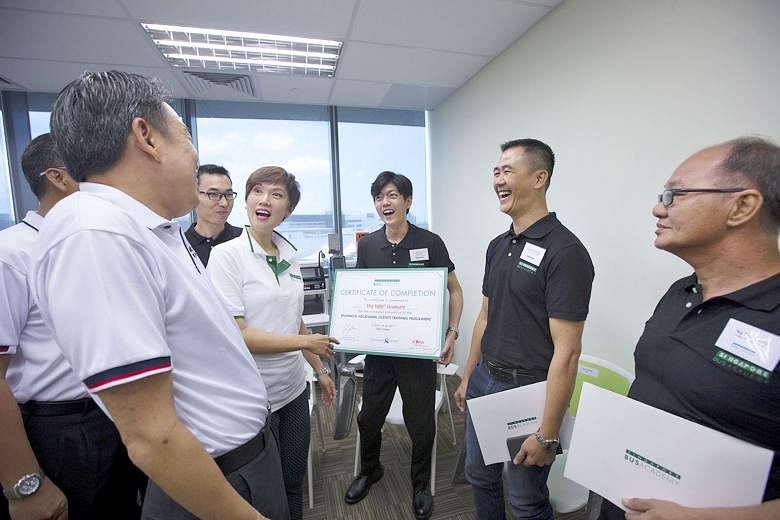In the 10 months since it opened, the Singapore Bus Academy has trained about 1,000 bus captains, 70 per cent of whom are Singaporeans and permanent residents.
Of these, half are above the age of 40 and a quarter are above 50 years old.
Second Minister for Manpower Josephine Teo revealed these statistics yesterday at a graduation ceremony for 20 bus captains who took a course to upgrade their skills.
The event also marked the graduation of the academy's 1,000th trainee, Mr Aw Wei Han.
Mrs Teo acknowledged the contributions of bus operators SBS Transit, SMRT, Tower Transit and Go-Ahead in recruiting local bus captains. She said: "You were prepared to challenge the notion that few locals could be persuaded to join (the bus industry) and you were also prepared to consider older workers and give them a chance."
Singaporeans have long shunned work as bus captains because of the long hours and poor pay associated with the job.
However, in recent years operators have started offering bus captains better pay and benefits, in an attempt to entice more people to take the job.
Mrs Teo also noted that the number of bus captains will need to increase to about 11,100 by 2022 - up from about 9,800 currently - to meet Singapore's transport needs.
This is despite the prospect of driverless technologies gaining ground, she said, as it is not known when driverless buses will become an "industry mainstay".
-
11.1k
The number of bus captains needed by 2022 - up from about 9,800 now - to meet Singapore's transport needs.
In April, it was announced that two driverless public buses - developed by a consortium led by ST Kinetics - are expected to make their debut here by October 2020.
Mrs Teo said that the Singapore Bus Academy must help workers in the bus industry refresh their skills and acquire new skills to stay relevant, including orientating them to a future where driverless technologies become "pervasive and commonplace".
Her comments were echoed by National Transport Workers' Union executive secretary Melvin Yong, who also attended the event.
In a Facebook post, the Tanjong Pagar GRC MP said: "With driverless technology being a potential disruptor to existing driving jobs in years to come, we need to plan ahead today to prepare our bus workers to be future-ready."
The Singapore Bus Academy - based at the Devan Nair Institute for Employment and Employability in Jurong East - was established by the Land Transport Authority to raise the professionalism of the local bus industry.
It plans to provide training to other workers in the bus industry, such as bus schedulers and technicians, to build up their resource management and technical skills.
More details will be announced in the fourth quarter of this year.
Correction note: In an earlier version of the story, we said in the 10 months since it opened, the Singapore Bus Academy has trained about 1,000 bus captains, 70 per cent of whom are Singaporeans. This figure should include permanent residents too. We are sorry for the error.


